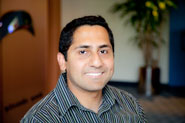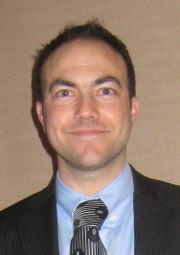| Version 11 (modified by , 10 years ago) (diff) |
|---|
GEC 19 Evening Demo Session
Location
Georgia Tech Technology Square Research Building, 85 Fifth Street NW
Schedule
TBA
Session Leaders
 |
 |
 |
| Heidi Picher Dempsey GENI Project Office |
Manu Gosain GENI Project Office |
Peter Stickney GENI Project Office |
Details
The evening demo session gives new and existing GENI experimenters and projects a chance to share their work in a live network environment. Demonstrations run for the entire length of the session, with teams on hand to answer questions and collaborate. This page lists scheduled demonstrations categorized in broad interest groups.
Directions and Logistics
Please visit Directions and Logistics for attendee and presenter logistics information.
Projects
GENI Infrastructure and Measurement Projects
Security and Data Exchange Projects
Experiments and Education
GENI-enabled Vehicular Sensing and Control Networking
We will demonstrate the vehicular sensing and control (VSC) platform prototype in this GEC. The platform is designed to enable researchers and experimenters to evaluate the VSC networking research in real world. Towards better understanding of our platform and related technologies, several applications also expect to make their debut in GEC 19. By doing this, we hope to get feedbacks and comments for further improvement and extension.
Participants:
- Hongwei Zhang, hongwei@wayne.edu, Wayne State Univ.
- Jing Hua, jinghua@wayne.edu, Wayne State Univ.
- Chuan Li, lanfker@gmail.com, Wayne State Univ.
- Yu Chen, yuchen.wayne@gmail.com, Wayne State Univ.
Simuulation-as-a-Service App
We will demonstrate a simple simulation-as-a-service (SMaaS) App that is setup within a hybrid cloud leveraging InstaGENI Rack resources. The SMaaS App use case involves TotalSim using GENI for PaaS experiments, which will enable them to deliver their App (that has data-intensive computation and data movement workflows) in SaaS form to their customers.
Participants:
- Prasad Calyam, Prasad Calyam, Ohio Supercomputer Center
SDN-Video-Orchestrator
We will demonstrate Software-defined networking (SDN) controller orchestrated traffic engineering for video traffic. We will present an OpenFlow-enabled SDN architecture that works in tandem with MPEG-DASH to allow video clients to stream videos seamlessly. This work is an extension to our project titled “SDN based application for efficient video streaming”, which was the recipient of the Internet2 2013 Innovative Application Award.
Partcipants:
- Aditi Ghag, aditivghag@gmail.com, Georgia Tech
Jacks
We will be demonstrating the first prototype of Jacks, the successor to Flack.
Participants:
- Rob Ricci, ricci@cs.utah.edu, Univ of Utah
IDMS
The Intelligent Data Movement System (IDMS) project will demonstrate data dissemination across multiple GENI aggregates. IDMS will use a combination of services running as appliance images on GENI nodes that are responsible for the storage and efficient movement of data between sites.
Participants:
- Ezra Kissel, kissel@cis.udel.edu, Univ. of Delaware
ProtoRINA over GENI
We will demonstrate ProtoRINA, Boston University's prototype of the Recursive InterNetwork Architecture (RINA, http://csr.bu.edu/rina). The demo presents several fundamental RINA experiments (e.g., dynamic service layer instantiation) over GENI resources, and demonstrates the flexibility of RINA to manage a network by configuring different routing policies.
Participants:
- Ibrahim Matta, matta@bu.edu, Boston University
Wireless Projects
WiMax Connectivity and Monitoring
WiMax connectivity and monitoring demo at a remote location.
Participants:
- Wisconsin Wireless and NetworkinG Systems (WiNGS) Laboratory
- Derek Meyer, dmeyer@cs.wisc.edu
- Suman Banerjee, suman@cs.wisc.edu
- Thomas Steele, Kemp Natural Resources Station, Univ. of Wisconsin
Federation / International Projects
SDX-iGENI: Software Define Network Exchange for International GENI
We will demonstrate the initial prototype for Software Define Network Exchange(SDX) at StarLight which will serve as exchange point for projects of members of the Consortium For International Advanced Networking Research using the "iGENI/Slice Around The World" as a platform for Advanced Network Research and other Science Research.
The "Slice Around the World" demonstration initiative was established to demonstrate the powerful potential of designing and implementing world-wide environments consisting of Global computational and storage clouds closely integrated with highly programmable networks. The initiative has been established by network research centers/research labs that are participating in multiple next generation networking activities, including those developing large scale distributed experimental network research environment, such as those be implemented by such initiatives as the NSF Global Environment for Network Innovations (GENI), the EU Future Internet Research Environment (FIRE), the Japanese New Generation Internet, the Korean Future Internet initiatives, the German Future Internet Lab (G-Lab), the Brazilian future Internet initiative and others. These environments are being developed by researchers for researchers. An important goal for many of the current projects would be to have persistent global environments directly developed and managed by the research community to support their experimental research.
Participants:
- Jim Chen, jim-chen@northwestern.edu, Northwestern Univ.
Attachments (7)
- GEC19-NETMAP.pdf (324.1 KB) - added by 10 years ago.
- GEC19-SDP.pdf (465.2 KB) - added by 10 years ago.
- 1908_GEC19Poster.pdf (848.2 KB) - added by 10 years ago.
- 1914_GEC19 Poster_WayneStateU-final.pdf (1.7 MB) - added by 10 years ago.
- 1921_GEC19-poster[1].pdf (27.5 MB) - added by 10 years ago.
- 1934_GEC19-DemoPoster.pptx (559.7 KB) - added by 10 years ago.
- 1957_GEC 19 Poster.pdf (84.6 KB) - added by 10 years ago.
